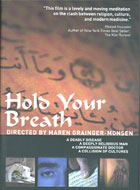
Hold Your Breath 2005
Distributed by Fanlight Productions, 32 Court St., 21st Floor, Brooklyn, NY 11201; 800-876-1710
Produced by Maren Grainger-Monsen and Julia Haslett
Directed by Maren Grainger-Monsen
DVD, color, 58 min.
College - Adult
Health Sciences, Bioethics, Multicultural Studies, Middle Eastern Studies, Social Work
Date Entered: 12/20/2006
Reviewed by Lori Widzinski, Health Sciences Library, University at Buffalo, State University of New YorkFilm director and MD Maren Grainger-Monsen has created a beautifully honest film about the frustrations of delivering and receiving good health care in a multicultural environment. The interest in cultural competence in health care has been growing steadily in academic circles over the past few years, and thanks to films like this, the issue is coming to light for the average health care consumer.
Focusing on Islamic traditions and cultural norms coming into conflict with current Western medical practices, the film follows Afghani immigrant Mohammad Kochi and his family. Mr. Kochi is diagnosed with incurable gastric cancer. From the very beginning of his health care journey, this man who knows very little English, understands the word “cancer” spoken by his doctor, thwarting attempts by his well intentioned family and friends to keep this diagnosis secret from him. As he deals with his illness, always accompanied on doctor visits by friends or family acting as interpreters, the struggle to maintain his devout faith and still comply with efforts to help him feel better is painfully evident. Towards the end of his journey, his daughter begins to question whether or not medical options were interpreted correctly, and whether his physician was offering him the correct treatment options. It is clear, with hindsight, that all parties would have taken a different approach to treating Mr. Kochi’s cancer. Yet, as time runs out, you get the sense that everyone did their best for what they knew at the time, and Mr. Kochi did what he wanted to do, performing one last Haj to Mecca, and ultimately dying quietly at home.
Obviously, this film is a perfect fit for library collections supporting programs in the health sciences, and would also be beneficial for multicultural collections, Middle Eastern studies and social work collections. It will be eye-opening not only for students, but for the general public. Of special interest are the brief scenes of physicians in the middle of their weekly case reports, and the words from Dr. Fisher (Mr. Kochi’s primary oncologist) are compassionate and frustratingly poignant. Anyone who has been through, or accompanied someone through a difficult medical treatment, will identify with Mr. Kochi’s course. Technically, the film is very well done. The imagery is just a little heavy-handed, and the film is a tad long for classroom viewing in one sitting, but all in all, is highly recommended for academic media collections.
Hold Your Breath is a fine addition to Grainger-Monsen’s body of work on bioethical issues. Her other films, Worlds Apart is widely used in academic health sciences libraries, and The Vanishing Line has been broadcast on PBS.